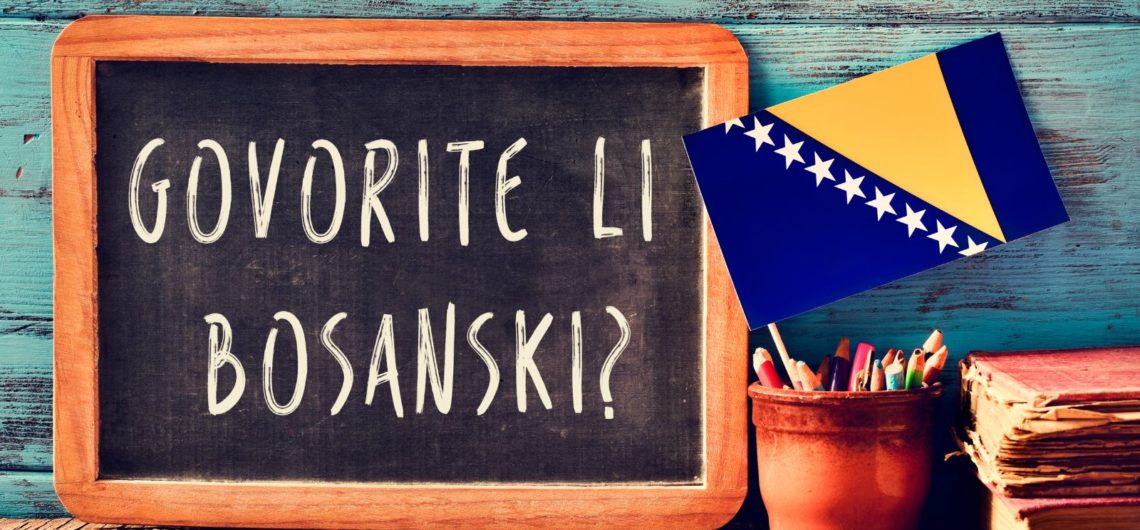It’s one of the most frequently asked questions about countries from the former Yugoslavia, and it’s not an easy one to answer. In fact, you can accidentally get into trouble if you’re not careful. The question is of course: ’What language do they speak there?’
What language do they speak in the Balkans?
If we’re talking about the former Yugoslavian countries, it breaks down like this:
The language spoken across the whole of the former Yugoslavia officially used to be called Serbo-Croat, but no-one calls it that anymore.
In Croatia, they call it Croatian, and they spell it with the Latin alphabet.
In Serbia, they call it Serbian, and they spell it with the Cyrillic alphabet.
In Bosnia and Herzegovina, they call it Bosnian (are you seeing a pattern here?), and they spell it with the Latin alphabet.
In Macedonia, they call it Macedonian and spell it with the Cyrillic alphabet (but not before removing some of the more complicated grammar, making it – interestingly – as similar to Bulgarian as its Yugo-brothers).
In Montenegro, they confusingly use both alphabets and while it’s officially called Montenegrin, in practice people there prefer the phrase naš jezik or naški (our language). Confused yet?
And in Slovenia, the language is sufficiently different that it’s its own thing, but all Slovenians will be able to speak and understand Serbo-Croat, the same as Germans can all speak “hoch-Deutsch” despite their regional dialects.

So, all the languages in the Balkans are the same?
No (bear with me here)! Albanian, Romanian and Greek are obviously completely different (yes, they are in the Balkans too), but the rest share the same southern Slavic roots. Slovenian, Macedonian and Bulgarian are languages that I can figure out but can’t speak fluently but Serbian, Croatian, Bosnian and Montenegrin are identical, despite what each nation might insist (except the diffident Montenegrins!). Yes, there are some differences but it’s comparable to those between regular British English and American English.
You say mljeko, I say mleko (milk). You say kruh and I say hljeb (bread). Tribal squabbles will occasionally lead to one of your Balkan acquaintances insisting that their language is unique – but trust me, it isn’t. That would be like a Brit, American, Aussie and a Kiwi all arguing that their languages are distinct from one another when really we just have different words for car parts and flip-flops.
Related:
Say ‘one thousand’ in Serbia by using the Croatian word tisuća instead of the Serbian word hiljada and you will be politely corrected. Call the language Srpsko-Hrvatsko (Serbo-Croat) in Croatia and you’ll be reminded that it’s actually Hrvatsko-Srpsko (Croat-Serb).
If I’m told govoriš baš dobro Srpski (‘you speak Serbian very well’) when I’m in Montenegro, I know that whoever I’m talking to considers themselves a Serb, whether they are a Montenegrin citizen or not. On the other hand, if they tell me govoriš baš dobro naš jezik (‘you speak our language very well’), I know that they consider themselves Montenegrin.
Political correctness gone bonkers
It got seriously silly on the Croatian side for a while after WW2, when in an attempt to make the Croatian variant more distinct from its neighbours, they went all Academie Francaise and tried to ban imported words .
In this manner, helikopter (a helicopter) became a zraknomlat (an “air-beater”) and bicikl (a bicycle) became a medunožniguraj (a “between-the-legs-pusher”). The joke became that rather than use the Serbian word for “belt” – kajs – the Croatians would call it an okolotrbušnipantalodržač (literally, a round-the-tummy-trouser-holder-upper). Most of these words have now been gently retired, thankfully, although you will still fly into the zračna luka (“air port”) not the aerodrom and the word for fudbal (football) remains determinedly nogomet (“leg-ball”).
Ok, so what do you call the Balkan language?
Well, we just hedge our bets and refer to the language as jezik (er…the language). Got an issue with that? Well, at least we’ve gone to the trouble of learning it – and believe me, with seven cases and five extra letters as well as all of the above nonsense, never has that phrase rung truer!
Top tips for learning Croatian/Serbian/Bosnian/Montenegrin:
We highly recommend learning a few words and choice phrases, but don’t sweat about learning the “correct” language for wherever you’re visiting. Learn Croatian to visit Serbia, learn Serbian to visit Croatia…most locals will simply be delighted that you’ve given it a go. And then mock your terrible accent.
The grammar is horrendous, but to make things easier, jezik is completely phonetic, unlike English. Say it just as you see it.
“j”s are soft – like an English “y”. Vowels are all short – no “ay” or “oh” sounds. Ć is pronounced “tyuh”. Č is pronounced “ch”. Š is “sh”. Ž is “zh”, like Zhivago, or the French soft “g”. A “d” with a line through it is pronounced “dyuh”.
Beware transliteration! This is a curious practice where foreign words are spelled phonetically to make them easier to write in Cyrillic, and then very often transposed back into Latin for Montenegrin or Bosnian audiences (Croats, fortunately, just learn how to say it our way). Thus my last name is often rendered “Hejvud” (there is no “w” in jezik), and the star of the Oceans Eleven movies is Džordž Kluni. Interestingly, American pronunciation is favoured, so Brad Pitt is renamed Bred and the guy taking down the Joker is Betmen.
Still want to give it a go? I recommend using the Drops or Ling apps for online learning, taking video classes via Preply, or best of all, marrying a native speaker…
Find more inspiration, travel guides and recipes from the Balkans on the blog.

